Xiaomi Case Study: Leveraging Institution Environment and Resources for Growth
VerifiedAdded on 2022/09/30
|9
|2348
|104
AI Summary
This case study explores how Xiaomi leveraged the institution environment in China to challenge global players such as Samsung and Apple. It also discusses the obstacles Xiaomi faces in India and Brazil and how it can overcome them. Additionally, it examines the resources Xiaomi created to enable its growth in China and whether it has a sustainable advantage in China.
Contribute Materials
Your contribution can guide someone’s learning journey. Share your
documents today.
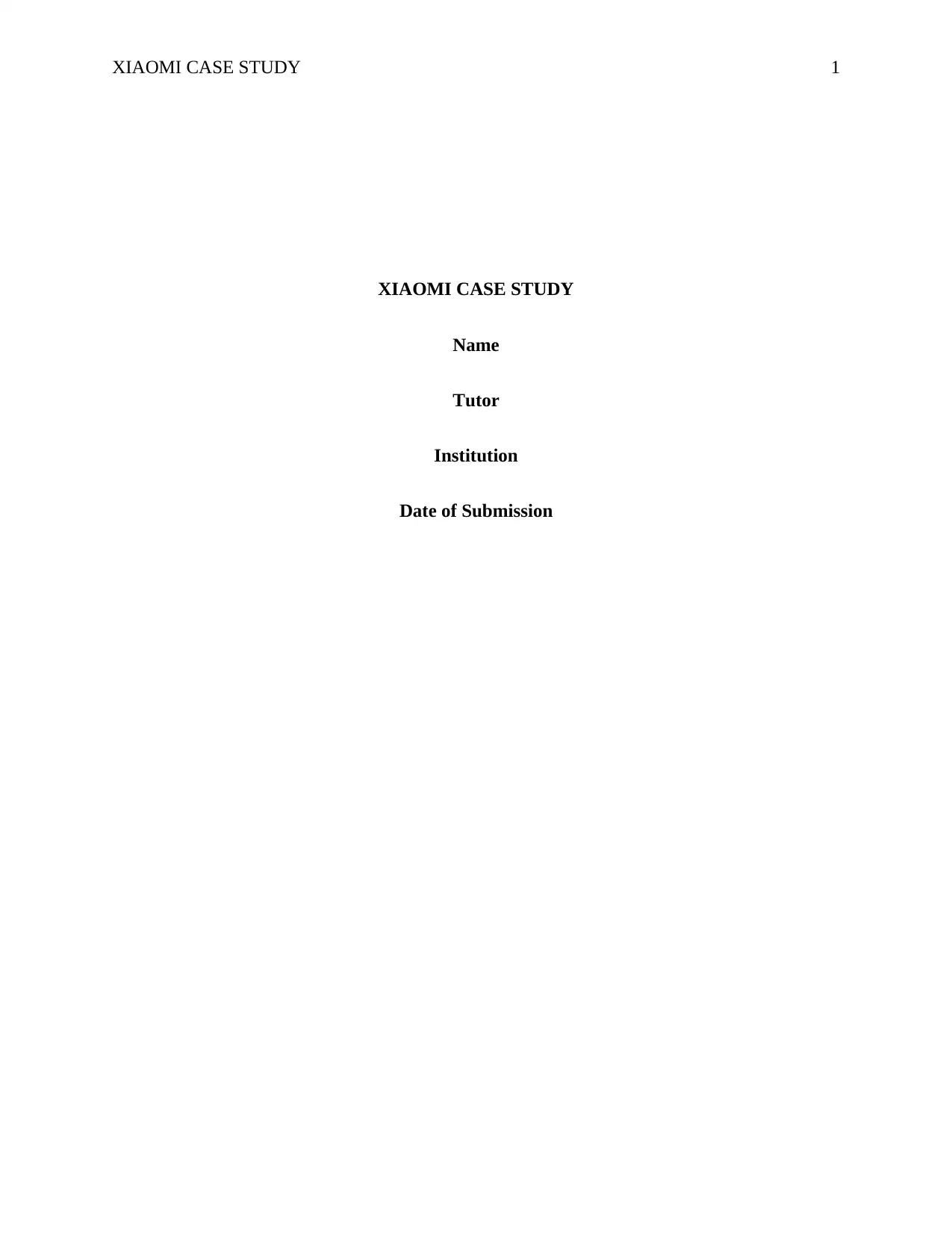
XIAOMI CASE STUDY 1
XIAOMI CASE STUDY
Name
Tutor
Institution
Date of Submission
XIAOMI CASE STUDY
Name
Tutor
Institution
Date of Submission
Secure Best Marks with AI Grader
Need help grading? Try our AI Grader for instant feedback on your assignments.
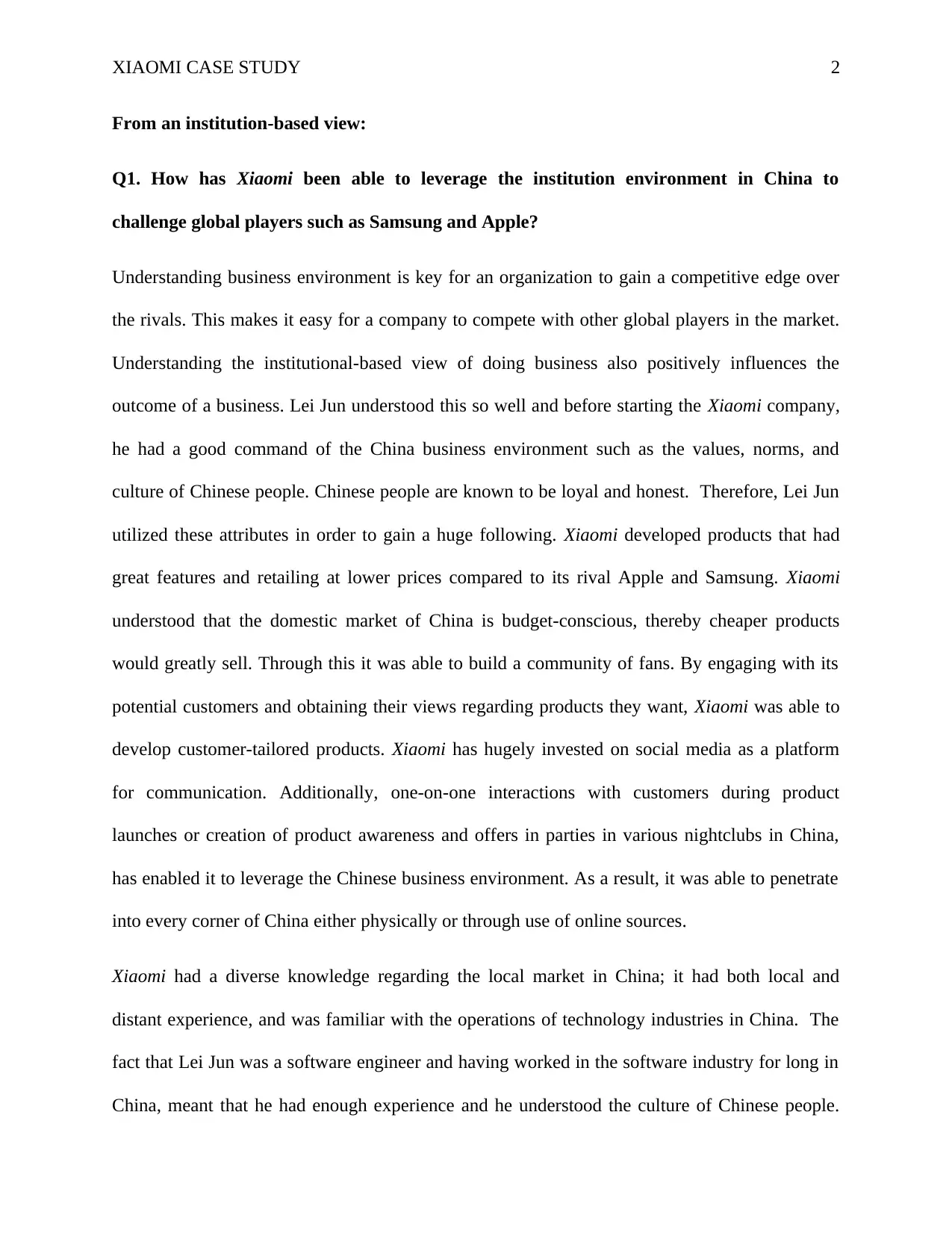
XIAOMI CASE STUDY 2
From an institution-based view:
Q1. How has Xiaomi been able to leverage the institution environment in China to
challenge global players such as Samsung and Apple?
Understanding business environment is key for an organization to gain a competitive edge over
the rivals. This makes it easy for a company to compete with other global players in the market.
Understanding the institutional-based view of doing business also positively influences the
outcome of a business. Lei Jun understood this so well and before starting the Xiaomi company,
he had a good command of the China business environment such as the values, norms, and
culture of Chinese people. Chinese people are known to be loyal and honest. Therefore, Lei Jun
utilized these attributes in order to gain a huge following. Xiaomi developed products that had
great features and retailing at lower prices compared to its rival Apple and Samsung. Xiaomi
understood that the domestic market of China is budget-conscious, thereby cheaper products
would greatly sell. Through this it was able to build a community of fans. By engaging with its
potential customers and obtaining their views regarding products they want, Xiaomi was able to
develop customer-tailored products. Xiaomi has hugely invested on social media as a platform
for communication. Additionally, one-on-one interactions with customers during product
launches or creation of product awareness and offers in parties in various nightclubs in China,
has enabled it to leverage the Chinese business environment. As a result, it was able to penetrate
into every corner of China either physically or through use of online sources.
Xiaomi had a diverse knowledge regarding the local market in China; it had both local and
distant experience, and was familiar with the operations of technology industries in China. The
fact that Lei Jun was a software engineer and having worked in the software industry for long in
China, meant that he had enough experience and he understood the culture of Chinese people.
From an institution-based view:
Q1. How has Xiaomi been able to leverage the institution environment in China to
challenge global players such as Samsung and Apple?
Understanding business environment is key for an organization to gain a competitive edge over
the rivals. This makes it easy for a company to compete with other global players in the market.
Understanding the institutional-based view of doing business also positively influences the
outcome of a business. Lei Jun understood this so well and before starting the Xiaomi company,
he had a good command of the China business environment such as the values, norms, and
culture of Chinese people. Chinese people are known to be loyal and honest. Therefore, Lei Jun
utilized these attributes in order to gain a huge following. Xiaomi developed products that had
great features and retailing at lower prices compared to its rival Apple and Samsung. Xiaomi
understood that the domestic market of China is budget-conscious, thereby cheaper products
would greatly sell. Through this it was able to build a community of fans. By engaging with its
potential customers and obtaining their views regarding products they want, Xiaomi was able to
develop customer-tailored products. Xiaomi has hugely invested on social media as a platform
for communication. Additionally, one-on-one interactions with customers during product
launches or creation of product awareness and offers in parties in various nightclubs in China,
has enabled it to leverage the Chinese business environment. As a result, it was able to penetrate
into every corner of China either physically or through use of online sources.
Xiaomi had a diverse knowledge regarding the local market in China; it had both local and
distant experience, and was familiar with the operations of technology industries in China. The
fact that Lei Jun was a software engineer and having worked in the software industry for long in
China, meant that he had enough experience and he understood the culture of Chinese people.
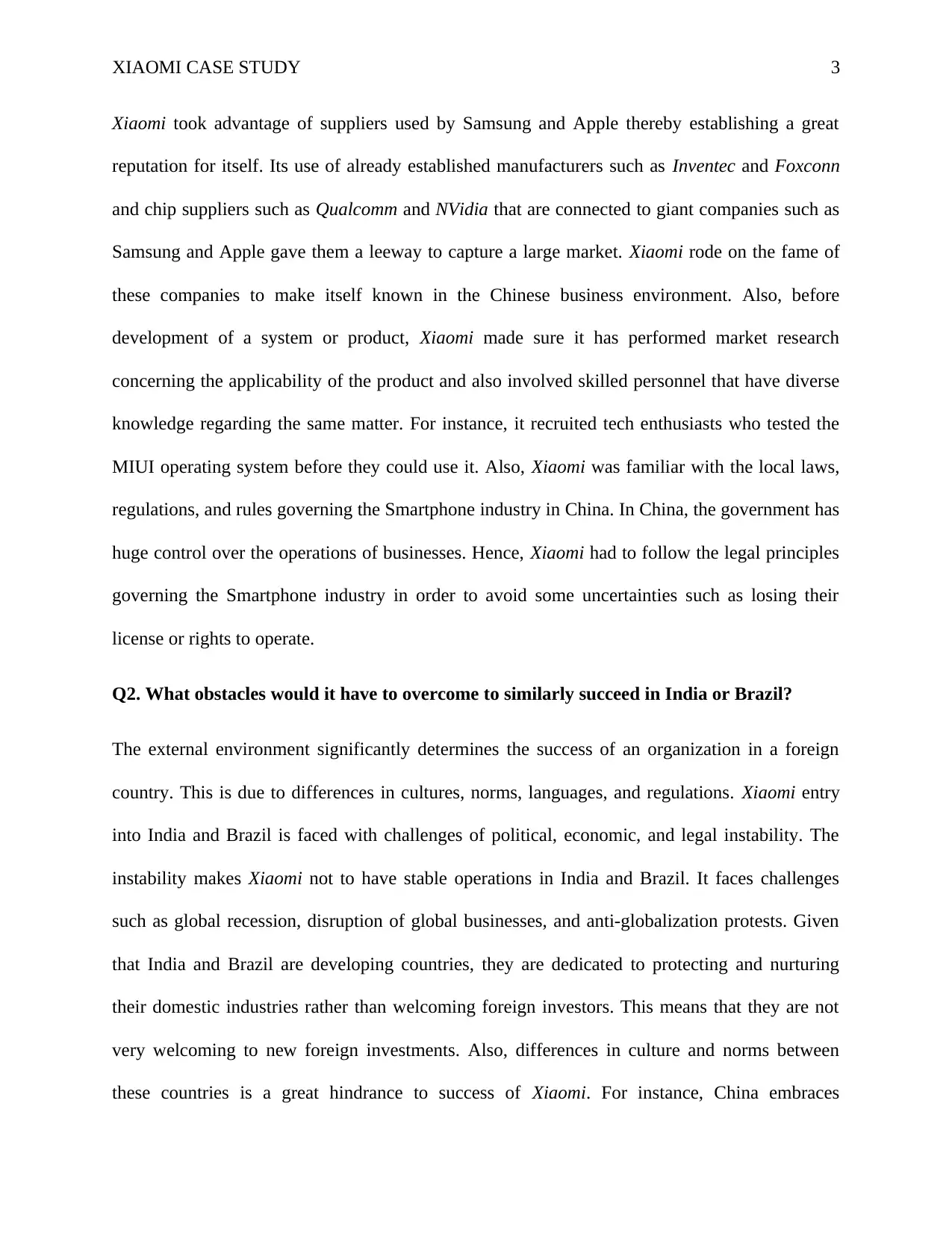
XIAOMI CASE STUDY 3
Xiaomi took advantage of suppliers used by Samsung and Apple thereby establishing a great
reputation for itself. Its use of already established manufacturers such as Inventec and Foxconn
and chip suppliers such as Qualcomm and NVidia that are connected to giant companies such as
Samsung and Apple gave them a leeway to capture a large market. Xiaomi rode on the fame of
these companies to make itself known in the Chinese business environment. Also, before
development of a system or product, Xiaomi made sure it has performed market research
concerning the applicability of the product and also involved skilled personnel that have diverse
knowledge regarding the same matter. For instance, it recruited tech enthusiasts who tested the
MIUI operating system before they could use it. Also, Xiaomi was familiar with the local laws,
regulations, and rules governing the Smartphone industry in China. In China, the government has
huge control over the operations of businesses. Hence, Xiaomi had to follow the legal principles
governing the Smartphone industry in order to avoid some uncertainties such as losing their
license or rights to operate.
Q2. What obstacles would it have to overcome to similarly succeed in India or Brazil?
The external environment significantly determines the success of an organization in a foreign
country. This is due to differences in cultures, norms, languages, and regulations. Xiaomi entry
into India and Brazil is faced with challenges of political, economic, and legal instability. The
instability makes Xiaomi not to have stable operations in India and Brazil. It faces challenges
such as global recession, disruption of global businesses, and anti-globalization protests. Given
that India and Brazil are developing countries, they are dedicated to protecting and nurturing
their domestic industries rather than welcoming foreign investors. This means that they are not
very welcoming to new foreign investments. Also, differences in culture and norms between
these countries is a great hindrance to success of Xiaomi. For instance, China embraces
Xiaomi took advantage of suppliers used by Samsung and Apple thereby establishing a great
reputation for itself. Its use of already established manufacturers such as Inventec and Foxconn
and chip suppliers such as Qualcomm and NVidia that are connected to giant companies such as
Samsung and Apple gave them a leeway to capture a large market. Xiaomi rode on the fame of
these companies to make itself known in the Chinese business environment. Also, before
development of a system or product, Xiaomi made sure it has performed market research
concerning the applicability of the product and also involved skilled personnel that have diverse
knowledge regarding the same matter. For instance, it recruited tech enthusiasts who tested the
MIUI operating system before they could use it. Also, Xiaomi was familiar with the local laws,
regulations, and rules governing the Smartphone industry in China. In China, the government has
huge control over the operations of businesses. Hence, Xiaomi had to follow the legal principles
governing the Smartphone industry in order to avoid some uncertainties such as losing their
license or rights to operate.
Q2. What obstacles would it have to overcome to similarly succeed in India or Brazil?
The external environment significantly determines the success of an organization in a foreign
country. This is due to differences in cultures, norms, languages, and regulations. Xiaomi entry
into India and Brazil is faced with challenges of political, economic, and legal instability. The
instability makes Xiaomi not to have stable operations in India and Brazil. It faces challenges
such as global recession, disruption of global businesses, and anti-globalization protests. Given
that India and Brazil are developing countries, they are dedicated to protecting and nurturing
their domestic industries rather than welcoming foreign investors. This means that they are not
very welcoming to new foreign investments. Also, differences in culture and norms between
these countries is a great hindrance to success of Xiaomi. For instance, China embraces
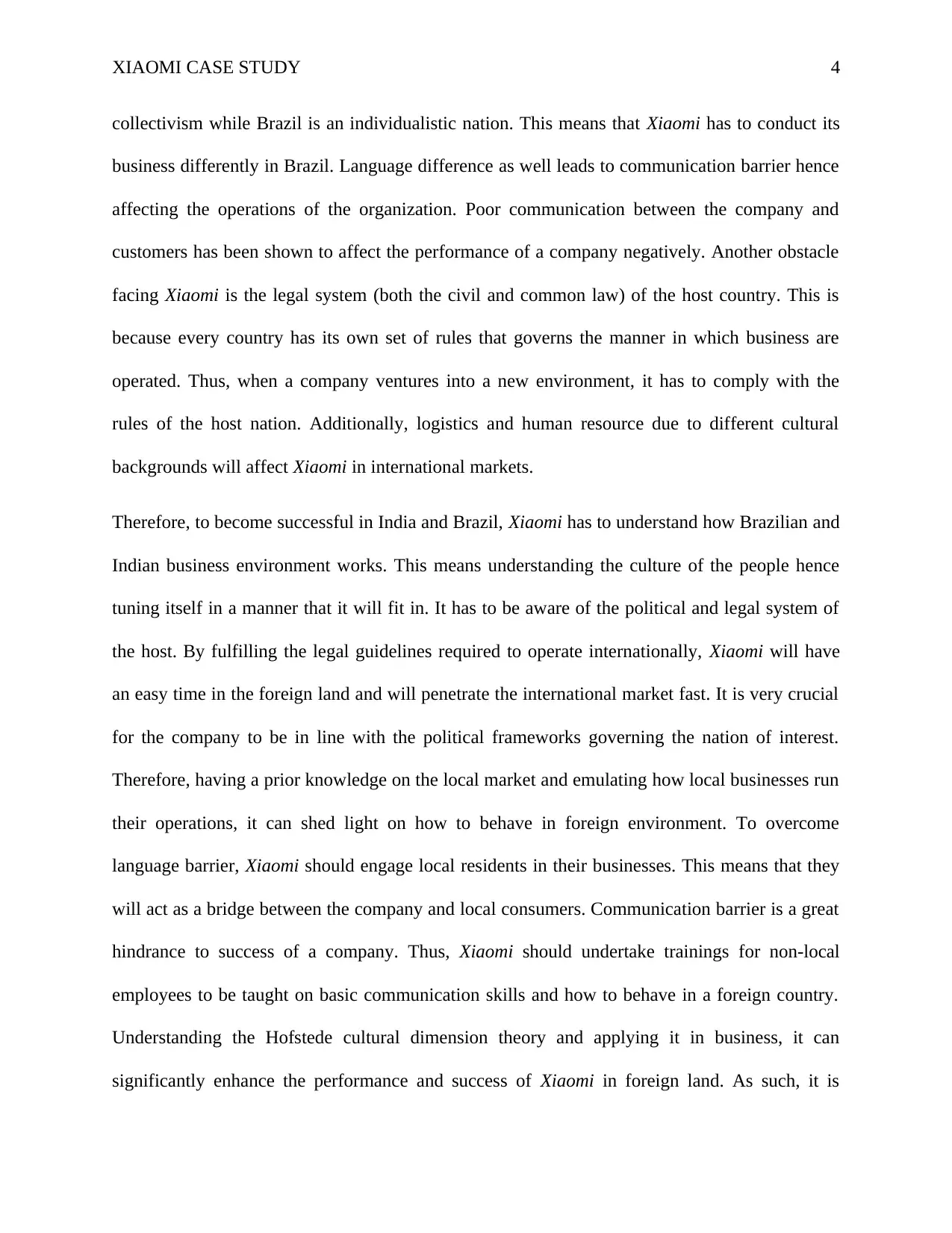
XIAOMI CASE STUDY 4
collectivism while Brazil is an individualistic nation. This means that Xiaomi has to conduct its
business differently in Brazil. Language difference as well leads to communication barrier hence
affecting the operations of the organization. Poor communication between the company and
customers has been shown to affect the performance of a company negatively. Another obstacle
facing Xiaomi is the legal system (both the civil and common law) of the host country. This is
because every country has its own set of rules that governs the manner in which business are
operated. Thus, when a company ventures into a new environment, it has to comply with the
rules of the host nation. Additionally, logistics and human resource due to different cultural
backgrounds will affect Xiaomi in international markets.
Therefore, to become successful in India and Brazil, Xiaomi has to understand how Brazilian and
Indian business environment works. This means understanding the culture of the people hence
tuning itself in a manner that it will fit in. It has to be aware of the political and legal system of
the host. By fulfilling the legal guidelines required to operate internationally, Xiaomi will have
an easy time in the foreign land and will penetrate the international market fast. It is very crucial
for the company to be in line with the political frameworks governing the nation of interest.
Therefore, having a prior knowledge on the local market and emulating how local businesses run
their operations, it can shed light on how to behave in foreign environment. To overcome
language barrier, Xiaomi should engage local residents in their businesses. This means that they
will act as a bridge between the company and local consumers. Communication barrier is a great
hindrance to success of a company. Thus, Xiaomi should undertake trainings for non-local
employees to be taught on basic communication skills and how to behave in a foreign country.
Understanding the Hofstede cultural dimension theory and applying it in business, it can
significantly enhance the performance and success of Xiaomi in foreign land. As such, it is
collectivism while Brazil is an individualistic nation. This means that Xiaomi has to conduct its
business differently in Brazil. Language difference as well leads to communication barrier hence
affecting the operations of the organization. Poor communication between the company and
customers has been shown to affect the performance of a company negatively. Another obstacle
facing Xiaomi is the legal system (both the civil and common law) of the host country. This is
because every country has its own set of rules that governs the manner in which business are
operated. Thus, when a company ventures into a new environment, it has to comply with the
rules of the host nation. Additionally, logistics and human resource due to different cultural
backgrounds will affect Xiaomi in international markets.
Therefore, to become successful in India and Brazil, Xiaomi has to understand how Brazilian and
Indian business environment works. This means understanding the culture of the people hence
tuning itself in a manner that it will fit in. It has to be aware of the political and legal system of
the host. By fulfilling the legal guidelines required to operate internationally, Xiaomi will have
an easy time in the foreign land and will penetrate the international market fast. It is very crucial
for the company to be in line with the political frameworks governing the nation of interest.
Therefore, having a prior knowledge on the local market and emulating how local businesses run
their operations, it can shed light on how to behave in foreign environment. To overcome
language barrier, Xiaomi should engage local residents in their businesses. This means that they
will act as a bridge between the company and local consumers. Communication barrier is a great
hindrance to success of a company. Thus, Xiaomi should undertake trainings for non-local
employees to be taught on basic communication skills and how to behave in a foreign country.
Understanding the Hofstede cultural dimension theory and applying it in business, it can
significantly enhance the performance and success of Xiaomi in foreign land. As such, it is
Secure Best Marks with AI Grader
Need help grading? Try our AI Grader for instant feedback on your assignments.
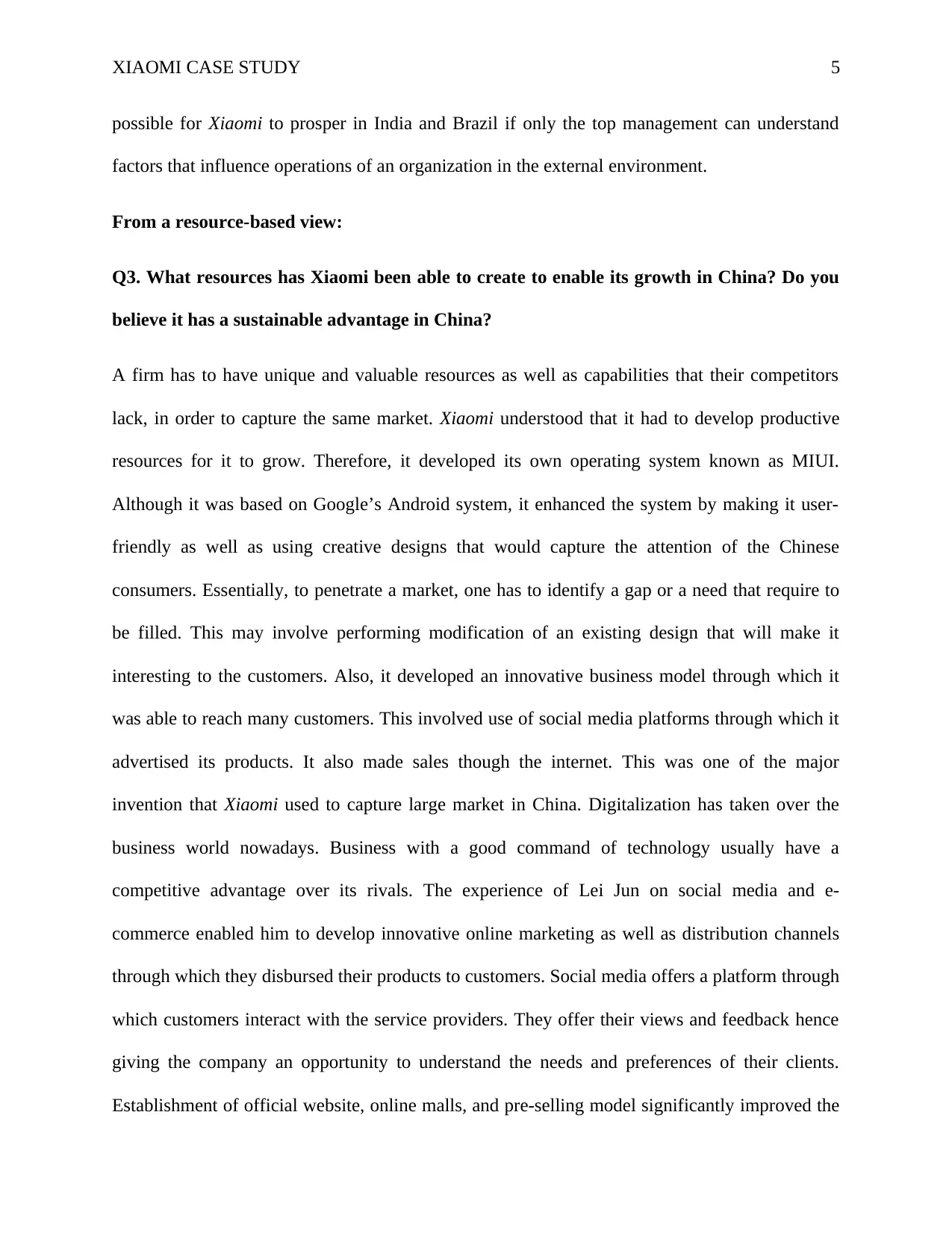
XIAOMI CASE STUDY 5
possible for Xiaomi to prosper in India and Brazil if only the top management can understand
factors that influence operations of an organization in the external environment.
From a resource-based view:
Q3. What resources has Xiaomi been able to create to enable its growth in China? Do you
believe it has a sustainable advantage in China?
A firm has to have unique and valuable resources as well as capabilities that their competitors
lack, in order to capture the same market. Xiaomi understood that it had to develop productive
resources for it to grow. Therefore, it developed its own operating system known as MIUI.
Although it was based on Google’s Android system, it enhanced the system by making it user-
friendly as well as using creative designs that would capture the attention of the Chinese
consumers. Essentially, to penetrate a market, one has to identify a gap or a need that require to
be filled. This may involve performing modification of an existing design that will make it
interesting to the customers. Also, it developed an innovative business model through which it
was able to reach many customers. This involved use of social media platforms through which it
advertised its products. It also made sales though the internet. This was one of the major
invention that Xiaomi used to capture large market in China. Digitalization has taken over the
business world nowadays. Business with a good command of technology usually have a
competitive advantage over its rivals. The experience of Lei Jun on social media and e-
commerce enabled him to develop innovative online marketing as well as distribution channels
through which they disbursed their products to customers. Social media offers a platform through
which customers interact with the service providers. They offer their views and feedback hence
giving the company an opportunity to understand the needs and preferences of their clients.
Establishment of official website, online malls, and pre-selling model significantly improved the
possible for Xiaomi to prosper in India and Brazil if only the top management can understand
factors that influence operations of an organization in the external environment.
From a resource-based view:
Q3. What resources has Xiaomi been able to create to enable its growth in China? Do you
believe it has a sustainable advantage in China?
A firm has to have unique and valuable resources as well as capabilities that their competitors
lack, in order to capture the same market. Xiaomi understood that it had to develop productive
resources for it to grow. Therefore, it developed its own operating system known as MIUI.
Although it was based on Google’s Android system, it enhanced the system by making it user-
friendly as well as using creative designs that would capture the attention of the Chinese
consumers. Essentially, to penetrate a market, one has to identify a gap or a need that require to
be filled. This may involve performing modification of an existing design that will make it
interesting to the customers. Also, it developed an innovative business model through which it
was able to reach many customers. This involved use of social media platforms through which it
advertised its products. It also made sales though the internet. This was one of the major
invention that Xiaomi used to capture large market in China. Digitalization has taken over the
business world nowadays. Business with a good command of technology usually have a
competitive advantage over its rivals. The experience of Lei Jun on social media and e-
commerce enabled him to develop innovative online marketing as well as distribution channels
through which they disbursed their products to customers. Social media offers a platform through
which customers interact with the service providers. They offer their views and feedback hence
giving the company an opportunity to understand the needs and preferences of their clients.
Establishment of official website, online malls, and pre-selling model significantly improved the
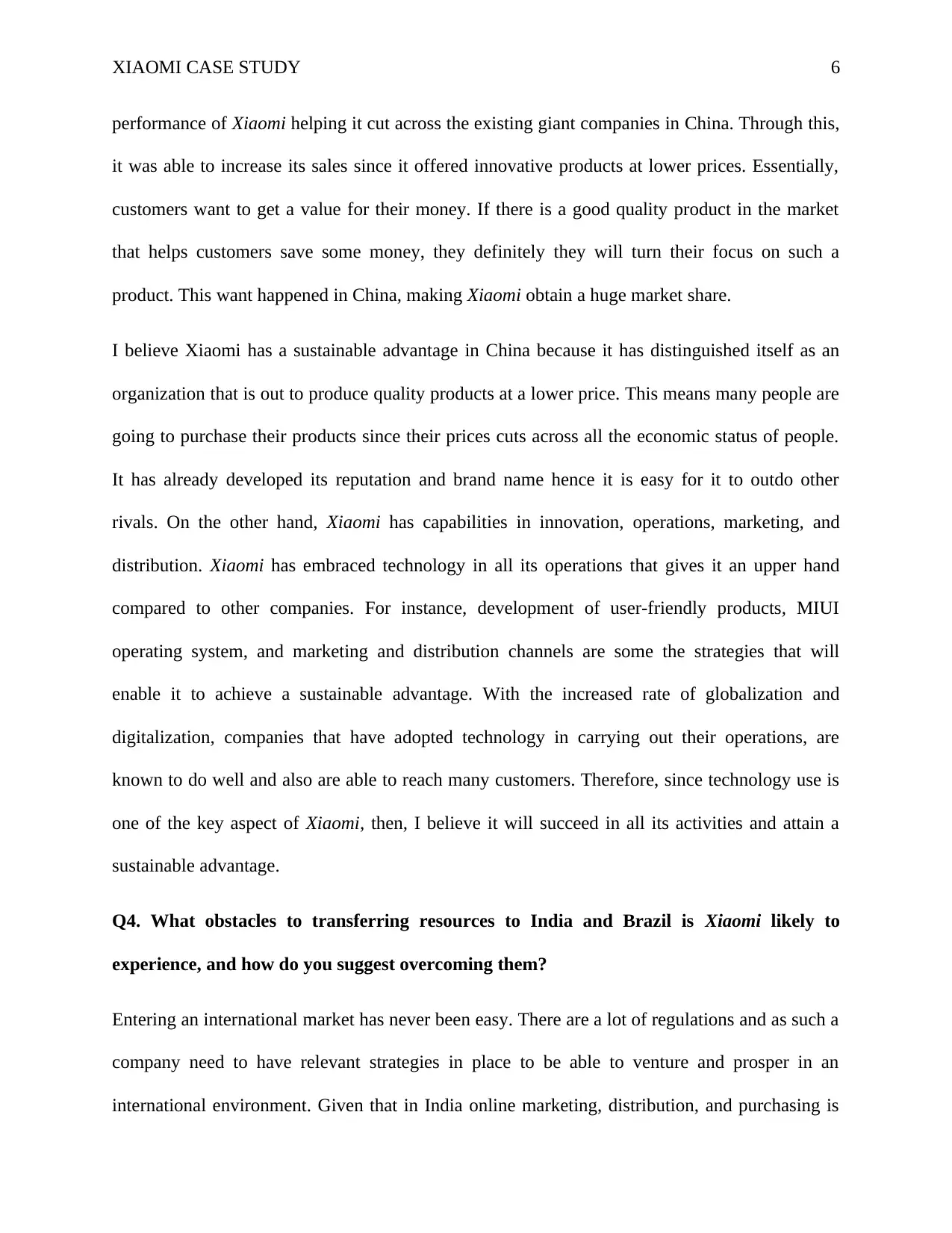
XIAOMI CASE STUDY 6
performance of Xiaomi helping it cut across the existing giant companies in China. Through this,
it was able to increase its sales since it offered innovative products at lower prices. Essentially,
customers want to get a value for their money. If there is a good quality product in the market
that helps customers save some money, they definitely they will turn their focus on such a
product. This want happened in China, making Xiaomi obtain a huge market share.
I believe Xiaomi has a sustainable advantage in China because it has distinguished itself as an
organization that is out to produce quality products at a lower price. This means many people are
going to purchase their products since their prices cuts across all the economic status of people.
It has already developed its reputation and brand name hence it is easy for it to outdo other
rivals. On the other hand, Xiaomi has capabilities in innovation, operations, marketing, and
distribution. Xiaomi has embraced technology in all its operations that gives it an upper hand
compared to other companies. For instance, development of user-friendly products, MIUI
operating system, and marketing and distribution channels are some the strategies that will
enable it to achieve a sustainable advantage. With the increased rate of globalization and
digitalization, companies that have adopted technology in carrying out their operations, are
known to do well and also are able to reach many customers. Therefore, since technology use is
one of the key aspect of Xiaomi, then, I believe it will succeed in all its activities and attain a
sustainable advantage.
Q4. What obstacles to transferring resources to India and Brazil is Xiaomi likely to
experience, and how do you suggest overcoming them?
Entering an international market has never been easy. There are a lot of regulations and as such a
company need to have relevant strategies in place to be able to venture and prosper in an
international environment. Given that in India online marketing, distribution, and purchasing is
performance of Xiaomi helping it cut across the existing giant companies in China. Through this,
it was able to increase its sales since it offered innovative products at lower prices. Essentially,
customers want to get a value for their money. If there is a good quality product in the market
that helps customers save some money, they definitely they will turn their focus on such a
product. This want happened in China, making Xiaomi obtain a huge market share.
I believe Xiaomi has a sustainable advantage in China because it has distinguished itself as an
organization that is out to produce quality products at a lower price. This means many people are
going to purchase their products since their prices cuts across all the economic status of people.
It has already developed its reputation and brand name hence it is easy for it to outdo other
rivals. On the other hand, Xiaomi has capabilities in innovation, operations, marketing, and
distribution. Xiaomi has embraced technology in all its operations that gives it an upper hand
compared to other companies. For instance, development of user-friendly products, MIUI
operating system, and marketing and distribution channels are some the strategies that will
enable it to achieve a sustainable advantage. With the increased rate of globalization and
digitalization, companies that have adopted technology in carrying out their operations, are
known to do well and also are able to reach many customers. Therefore, since technology use is
one of the key aspect of Xiaomi, then, I believe it will succeed in all its activities and attain a
sustainable advantage.
Q4. What obstacles to transferring resources to India and Brazil is Xiaomi likely to
experience, and how do you suggest overcoming them?
Entering an international market has never been easy. There are a lot of regulations and as such a
company need to have relevant strategies in place to be able to venture and prosper in an
international environment. Given that in India online marketing, distribution, and purchasing is
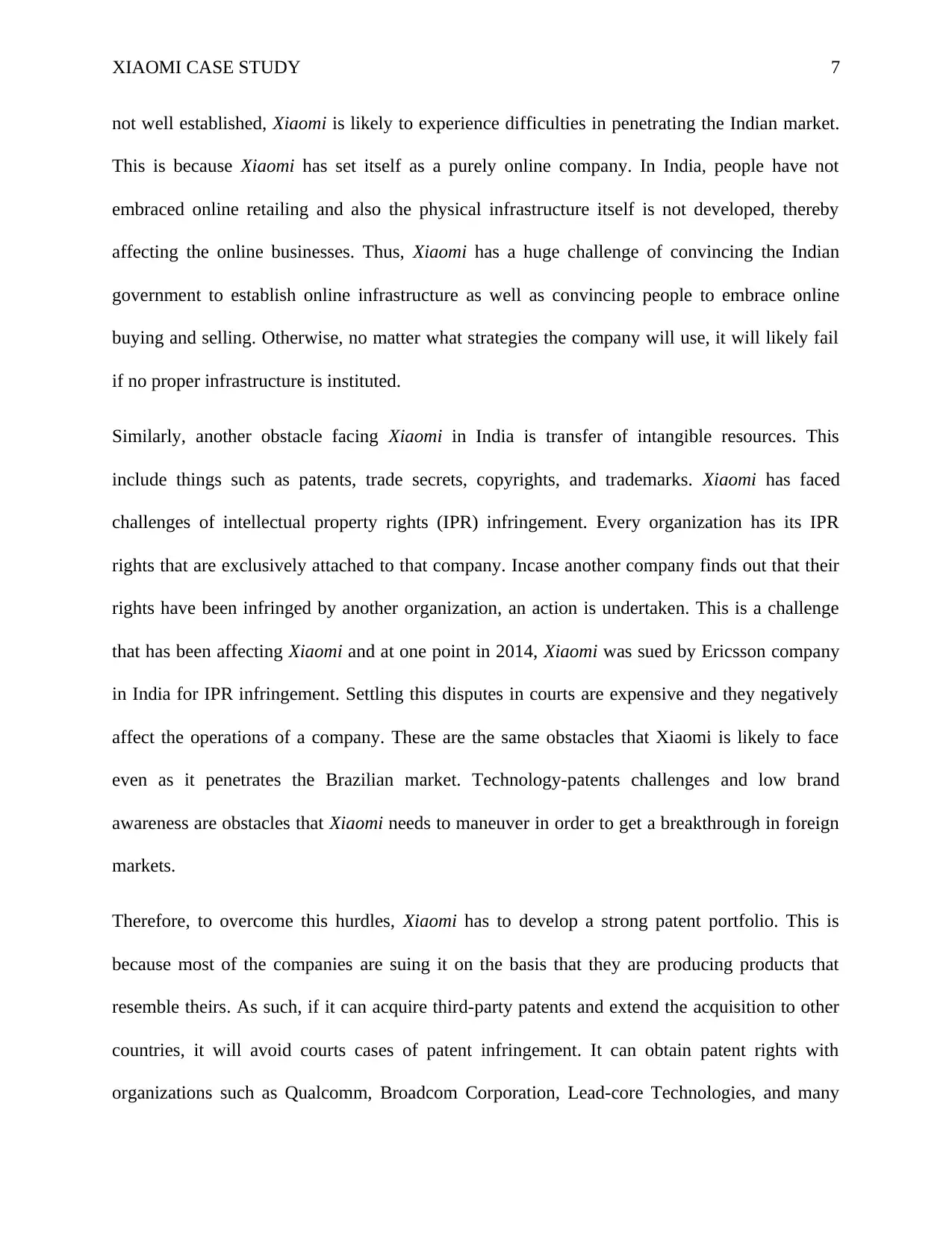
XIAOMI CASE STUDY 7
not well established, Xiaomi is likely to experience difficulties in penetrating the Indian market.
This is because Xiaomi has set itself as a purely online company. In India, people have not
embraced online retailing and also the physical infrastructure itself is not developed, thereby
affecting the online businesses. Thus, Xiaomi has a huge challenge of convincing the Indian
government to establish online infrastructure as well as convincing people to embrace online
buying and selling. Otherwise, no matter what strategies the company will use, it will likely fail
if no proper infrastructure is instituted.
Similarly, another obstacle facing Xiaomi in India is transfer of intangible resources. This
include things such as patents, trade secrets, copyrights, and trademarks. Xiaomi has faced
challenges of intellectual property rights (IPR) infringement. Every organization has its IPR
rights that are exclusively attached to that company. Incase another company finds out that their
rights have been infringed by another organization, an action is undertaken. This is a challenge
that has been affecting Xiaomi and at one point in 2014, Xiaomi was sued by Ericsson company
in India for IPR infringement. Settling this disputes in courts are expensive and they negatively
affect the operations of a company. These are the same obstacles that Xiaomi is likely to face
even as it penetrates the Brazilian market. Technology-patents challenges and low brand
awareness are obstacles that Xiaomi needs to maneuver in order to get a breakthrough in foreign
markets.
Therefore, to overcome this hurdles, Xiaomi has to develop a strong patent portfolio. This is
because most of the companies are suing it on the basis that they are producing products that
resemble theirs. As such, if it can acquire third-party patents and extend the acquisition to other
countries, it will avoid courts cases of patent infringement. It can obtain patent rights with
organizations such as Qualcomm, Broadcom Corporation, Lead-core Technologies, and many
not well established, Xiaomi is likely to experience difficulties in penetrating the Indian market.
This is because Xiaomi has set itself as a purely online company. In India, people have not
embraced online retailing and also the physical infrastructure itself is not developed, thereby
affecting the online businesses. Thus, Xiaomi has a huge challenge of convincing the Indian
government to establish online infrastructure as well as convincing people to embrace online
buying and selling. Otherwise, no matter what strategies the company will use, it will likely fail
if no proper infrastructure is instituted.
Similarly, another obstacle facing Xiaomi in India is transfer of intangible resources. This
include things such as patents, trade secrets, copyrights, and trademarks. Xiaomi has faced
challenges of intellectual property rights (IPR) infringement. Every organization has its IPR
rights that are exclusively attached to that company. Incase another company finds out that their
rights have been infringed by another organization, an action is undertaken. This is a challenge
that has been affecting Xiaomi and at one point in 2014, Xiaomi was sued by Ericsson company
in India for IPR infringement. Settling this disputes in courts are expensive and they negatively
affect the operations of a company. These are the same obstacles that Xiaomi is likely to face
even as it penetrates the Brazilian market. Technology-patents challenges and low brand
awareness are obstacles that Xiaomi needs to maneuver in order to get a breakthrough in foreign
markets.
Therefore, to overcome this hurdles, Xiaomi has to develop a strong patent portfolio. This is
because most of the companies are suing it on the basis that they are producing products that
resemble theirs. As such, if it can acquire third-party patents and extend the acquisition to other
countries, it will avoid courts cases of patent infringement. It can obtain patent rights with
organizations such as Qualcomm, Broadcom Corporation, Lead-core Technologies, and many
Paraphrase This Document
Need a fresh take? Get an instant paraphrase of this document with our AI Paraphraser
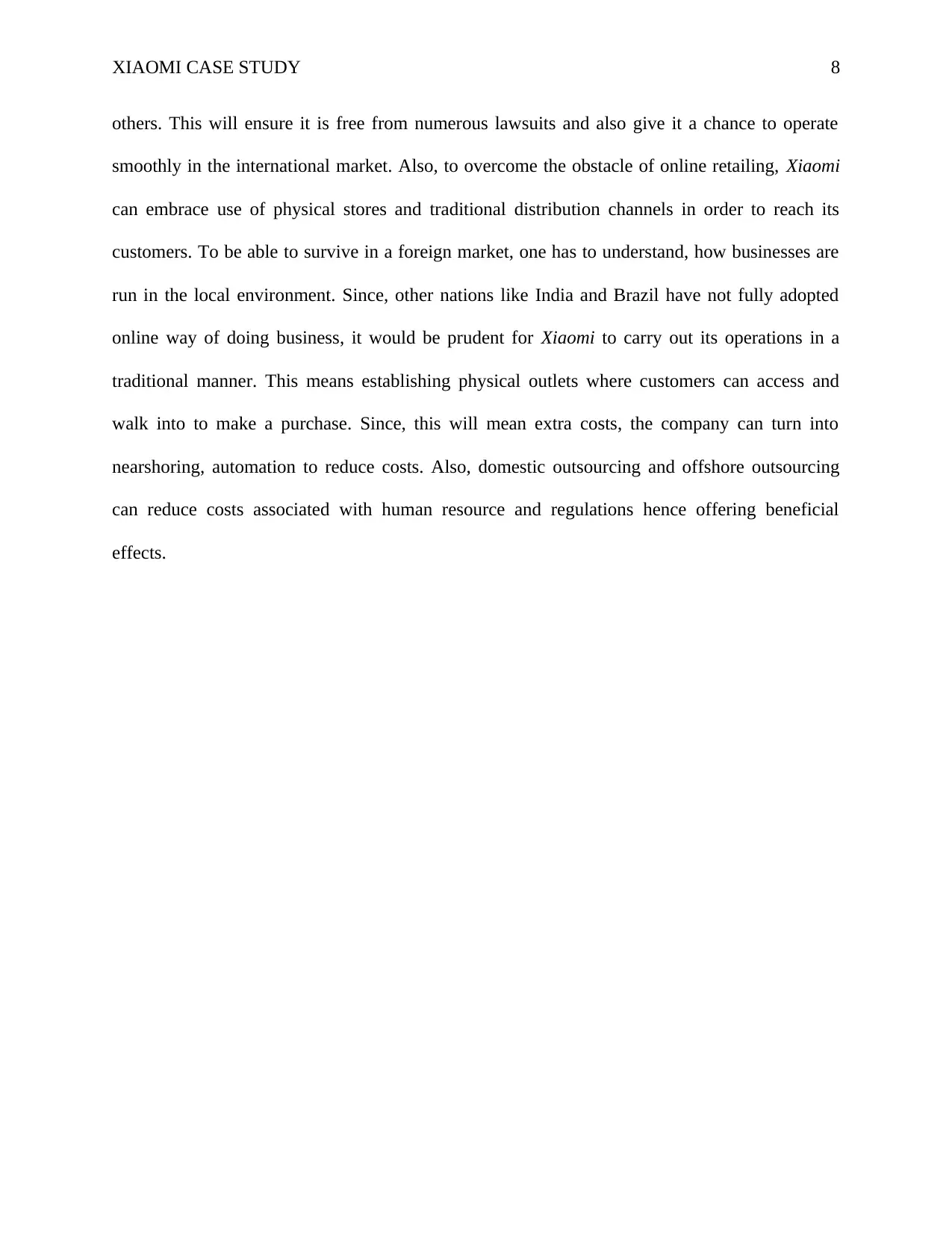
XIAOMI CASE STUDY 8
others. This will ensure it is free from numerous lawsuits and also give it a chance to operate
smoothly in the international market. Also, to overcome the obstacle of online retailing, Xiaomi
can embrace use of physical stores and traditional distribution channels in order to reach its
customers. To be able to survive in a foreign market, one has to understand, how businesses are
run in the local environment. Since, other nations like India and Brazil have not fully adopted
online way of doing business, it would be prudent for Xiaomi to carry out its operations in a
traditional manner. This means establishing physical outlets where customers can access and
walk into to make a purchase. Since, this will mean extra costs, the company can turn into
nearshoring, automation to reduce costs. Also, domestic outsourcing and offshore outsourcing
can reduce costs associated with human resource and regulations hence offering beneficial
effects.
others. This will ensure it is free from numerous lawsuits and also give it a chance to operate
smoothly in the international market. Also, to overcome the obstacle of online retailing, Xiaomi
can embrace use of physical stores and traditional distribution channels in order to reach its
customers. To be able to survive in a foreign market, one has to understand, how businesses are
run in the local environment. Since, other nations like India and Brazil have not fully adopted
online way of doing business, it would be prudent for Xiaomi to carry out its operations in a
traditional manner. This means establishing physical outlets where customers can access and
walk into to make a purchase. Since, this will mean extra costs, the company can turn into
nearshoring, automation to reduce costs. Also, domestic outsourcing and offshore outsourcing
can reduce costs associated with human resource and regulations hence offering beneficial
effects.
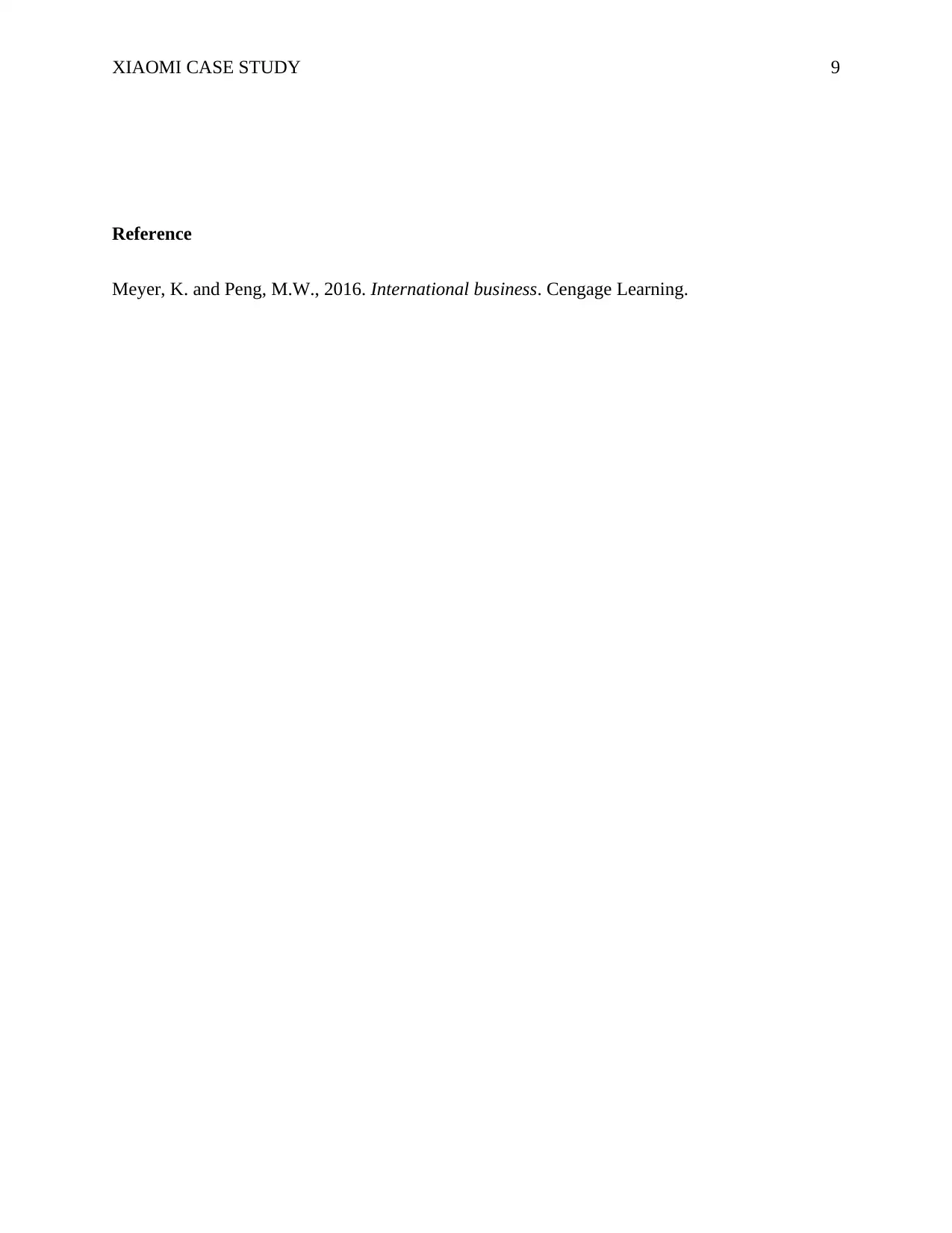
XIAOMI CASE STUDY 9
Reference
Meyer, K. and Peng, M.W., 2016. International business. Cengage Learning.
Reference
Meyer, K. and Peng, M.W., 2016. International business. Cengage Learning.
1 out of 9
Your All-in-One AI-Powered Toolkit for Academic Success.
+13062052269
info@desklib.com
Available 24*7 on WhatsApp / Email
![[object Object]](/_next/static/media/star-bottom.7253800d.svg)
Unlock your academic potential
© 2024 | Zucol Services PVT LTD | All rights reserved.



